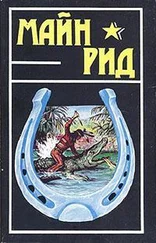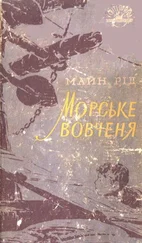It was natural that the young lady should feel sad at the absence of her worthy parent, who for many years had never been separated from her beyond the period of a few hours’ duration, or, at most, a single day. She would soon get used to it, and then all would be right again.
With some such reflections did Smythje account for the abstraction which he had observed in the behaviour of his betrothed.
During all the morning he had been assiduous in his attentions – more than wontedly so. He had been left by the Custos in a proud position – that of protector – and he was desirous of showing how worthy he was of the trust reposed in him.
Alas! in the opinion of Kate he was by far too assiduous.
The protégée felt importuned; and his most well-meant attentions had the effect only to weary her. Too glad would she have been to be left alone to her sighs and her sadness.
Shortly after breakfast, Smythje proposed a stroll – a short one. He had no zest for toilsome excursions; and, since the day of his shooting adventure, no zeal again to attempt any distant traverse of the forest.
The stroll was only to extend to the shrubbery and among the statues set there. The weather was temptingly fine. There was no reason why Kate Vaughan should refuse; and, with a mechanical air, she acceded to the proposal.
Smythje discussed the statues, drawing largely from the stock of classic lore which his University had afforded him – dilating more especially on those of Venus, Cupid, and Cleopatra, all suggestive of the tender sentiments that were stirring within his own romantic bosom, and to which, more than once, he took occasion to allude. Though narrowly did he watch to see what effect his fine speeches were producing, he failed to perceive any that gave him gratification. The countenance of his companion obstinately preserved that air of pre-occupation that had been visible upon it all the morning.
In the midst of one of his scholastic dissertations, the classical exquisite was interrupted by the advent of his valet, Thoms – who appeared coming from the house with the air of a servant who brings a message for his master.
The message was declared: a gentleman friend of Mr Smythje – for he had now many such in the Island – had called to see him. No particular business – merely a call of compliment.
The name was given. It was one which should be honoured by a polite reception; else the proud owner of Montagu Castle might have declined leaving the company in which he was upon so trivial a purpose. But the visitor was one of note – a particular friend, too. Miss Vaughan would not deem him rude, leaving her only for a moment?
“By no means,” said Kate, with a free haste that almost said as much as that she was only too glad to get quit of him.
Smythje followed his valet into the house; and the young Creole was left among the statues alone – herself the fairest shape in all that classical collection.
Chapter 11
A Strange Determination
For some moments after Smythje was gone, Kate Vaughan remained where he had left her – silent and motionless as the sculptured marbles by her side. Niobe [565] was near; and, as if by accident, the eyes of the young Creole turned upon the statue of the weeping daughter of Dione [566] .
“Ah!” muttered she, struck with a strange thought; “unhappy mother of a murdered offspring! If thy sadness was hard to endure as mine, thy punishment must have been a pleasure. Would that I, like thee, were suddenly turned into stone. Ah, me!”
And finishing her apostrophe [567] with a profound sigh, she stood for some time silently gazing upon the statue.
After a while her thoughts underwent some change; and along with it her eyes wandered away from the statues and the shrubbery. Her glance was turned upward towards the mountain, and rested upon its summit – the Jumbé Rock now glittering gaily under the full sheen of the sunlight.
“There,” soliloquised she, in a low murmur, “upon that rock, and there only, have I felt one hour of true happiness – that happiness of which I have read in books of romance, without believing in; but which I now know to be real – to gaze into the eyes of him you love, and think, as I then thought, that you are loved in return. Oh! it was bliss! it was bliss!”
The remembrance of that brief interview with her cousin – for it was to that her words referred – came so forcibly before the mind of the impassioned young Creole as to stifle her utterance, and for a moment or two she was silent.
Again she continued – “An hour, have I said? Ah! scarce a minute did the sweet delusion last; but had I my choice I would rather live that minute over again, than all the rest of my past life – certainly, than all of it that is to come!” Again she paused in her speech, still gazing upon the rock – whose sparkling surface seemed purposely presented to her eyes, as if to cheer her heart with the sweet souvenir it recalled.
“Oh! I wonder,” she exclaimed at length, “I wonder how it would be, were I but up there again! To stand on the spot where I stood! Could I fancy him, as then, beside me? Could I recall the look he gave me, and my own sweet thoughts as I returned it? Oh! it would be like some delicious dream!”
Passion again called for a pause; but soon after, her reflections found speech.
“And why should I not indulge in it? why not? What harm can it do me? Even if the souvenir should bring sadness, it cannot add to that which now overwhelms me. No; I need not fear to tempt the trial; and I shall. This very hour shall I go up and stand upon that same spot. There shall I invoke the past, and give to memory, to fancy, its fullest play. I need not fear. There will be no witness but the heaven above and the God who dwells in it – alike witness to the sacrifice of a broken heart made in the fulfilment of my duty.”
On completing this impassioned speech, the young girl raised a kerchief of white cambric which she carried in her hand, and hastily adjusting it over the luxuriant plaits of her hair, glided towards the rear of the mansion.
She did not turn aside to enter the house, nor even to warn any one of her sudden determination, but, hastening on, soon reached the back of the garden.
There a small wicket-gate gave her egress into the woods – a path from that point trending in traverses, zigzag fashion, up the mountain slope.
It was the same path she had followed upon the day of the eclipse; but how different were the thoughts that now agitated her bosom from those she had indulged in upon that memorable occasion! Even then, it is true, her spirits were far from being cheerful; but still there was hope ahead. She had not then arrived at the full knowledge of Herbert’s indifference towards her – of his determination towards her more fortunate rival. The circumstances that had since transpired – the scenes that had come under her own observation – the rumours heard and too substantially confirmed – all had combined to extinguish that little gleam of hope so faint and feebly flickering.
Indeed, there was upon that very morning a new thought in her mind, calculated still further to render her sad and humiliated.
The revelations which her father had made before starting on his journey – the admissions as to the inferiority of her race, and contingently of her social rank, which he had been compelled to make – had produced, and no wonder, a painful impression upon the spirits of the quinteroon.
She could not help asking herself whether Herbert’s disregard of her had aught to do with this? Was it possible that her own cousin was slighting her on account of this social distinction? Did he, too, feel shy of the taint ? More than once during that day had she mentally put these interrogatories without being able to determine whether they merited a negative or affirmative answer.
Читать дальше
Конец ознакомительного отрывка
Купить книгу











